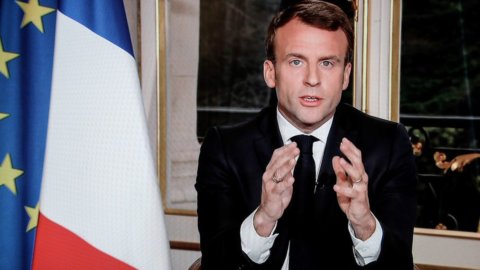After the emergency measures and the 100 billion euro support plan to support the economy, it is time for France to look to the future: today President Emmanuel Macron presented the details of the "France 2030" plan: a sort of transalpine Pnrr but mainly limited to the energy transition and the creation of the "champions of tomorrow", to ward off the risk of a decline of France repeatedly evoked. The plan, presented with great pomp at the Elysée with a long live broadcast on social media and a selected audience in attendance, with a final standing ovation, is earmarked for 30 billion euros, of which 8 billion just for the decarbonisation of industry and the production of power. One of these 8 billion will be used for nuclear power, a path that Macron intends to continue to follow, focusing on small-scale reactors and above all to have atomic energy recognized as green by the European Union.
The president's speech was preceded by a video listing all the French excellences, as if they already belonged to the past: Concorde, TGV, Airbus, etc. “And now?” is the question that appears at the end of the video and to which Macron answered. “There is no industry without innovation – he said -. In this sentence many public and private investments will be needed“. The president therefore evoked a model of sustainable growth, which protects the social system and is a protagonist and cooperative at an international level. In general, the objective is therefore to accompany the transition of sectors of excellence, from the automobile, to aeronautics and space, to create the technological champions of the future and "allow France to rediscover its environmental, industrial, technological, health and culture, returning to be a protagonist in Europe and in the world".
Starting from nuclear, for which Macron plays an important match at European level: the goal is to have smaller plants, that is, "safer and with less waste". Then there is the topic ofgreen hydrogen and other "new" renewables: France wants to build two gigafactories between now and 2030, investing half a billion in "breakthrough" innovations in clean energy. The goal is to reduce CO2 emissions from industry by 35% between 2015 and 2030, whereas in 2021 they were reduced by only 4%. Four billion euros will then be allocated to transport, another ambitious goal of the president: between now and 2030 the target is the production in France of 2 million electric or hybrid vehicles, and also to build the first low-carbon aircraft. Another 2 billion will be taken home by the agricultural sector, awaited by a revolution that is already underway: Foodtech, robotics, Big data, protection of biodiversity.
Finally, with an investment just below that destined for the reclamation of industry, there is the chapter dedicated to healthcare: 7,5 billion euros. Another 5 billion are intended for research and innovation, with an eye to the creation of an ecosystem of startups and businesses and deeptech (breaking technologies), while on the question of a totally state-owned cloud Macron spoke of "utopia". However, the transalpine president has not shied away from other strategic issues, in which he has invested a further 6 billion. One of the largest expenditure chapters and it is no coincidence that it also includes thorny dossiers, such as the supply of semiconductors, necessary above all for the automotive market: Macron wants to double indigenous production so as not to depend on geopolitical turmoil and China, just as he wants to protect himself on the wood supply chain, on rare earths (always important for electronic components), and does not say no to plastic but aim for recycling.
Compared to the Italian plan, which also disburses funds directly to businesses, the French one seems rather to hinge on the philosophy of the ecosystem, of creating the conditions so that new technological and ecologically sustainable realities can be born, grow and prosper. This is why no less than 2,5 billion euros will be invested generically in talents: as it reads verbatim the “France 2030” plan, which will ask schools, universities and research centers not only to train but also to enhance talent. What France will need to be great again.





